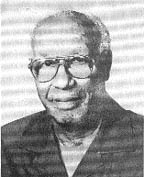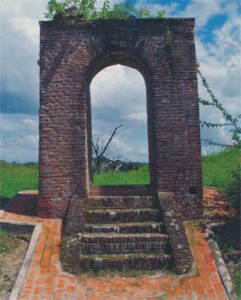Kyk-Over-Al, one of this country’s oldest and most respected literary journals, first appeared in December 1945 and sold for one shilling (24 cents). It attracted rich contributions − including poems, essays and reviews − from many young Guianese writers. Guyana Review reprints the first part of an essay by Richard Allsopp that was first published in Kyk-Over-Al, Vol. 2, No. 9 of December 1949.
By Richard Allsopp
If instead of its present designation, this article bore the title “What language do we speak?” the reader’s mind would at once have answered “Why, English, of course, if you’re talking of British Guiana and the West Indies?” The same answer is often given by West Indians to inquiring people in England, but I have deliberately not asked the question since my intention here is neither to query, criticise nor recommend, but simply to observe certain facts about the way we speak.
A full thesis on the subject would of course fill much more than this magazine so I shall limit my observations in this article to little more than a classified examination of the words (not even the expressions) we use and leave the reader to his own conclusions.
Before I begin, two things must be clear. The orthography in the case of many words, it will be seen, is conjectural but I think any Guianese may be relied upon to recognise the sound and meaning of the words being “described”; secondly, no apology is offered for the meanings of some of the words used, as here they serve the purpose only of academic examples of the particular class of words being discussed.
Let us begin by looking at a few words in general use among us: stelling, bateau, beautician, jumbie, dharo, worker, grabble. Of these, none is to be found in the Oxford Concise Dictionary except the last two and then they are not “our” words. The words are all known to and used by all “good” Guianese, but the first is Dutch, the second French, the third American, the fourth local of African origin, the fifth local of Indian origin, the sixth English with a special local connotation (- a seamstress) and the seventh English but with an exclusive local meaning (- to seize violently).

Perhaps then with such examples before us we may more readily concede that some at least of our words are non-English. This would already be a remarkable concession if the question were being argued, but a further distinction may be forced from us by our island neighbours, for none but a Guianese would know what were “a stelling, bateau, or dharoo” − just in case you query the second of this trio, let me remind you that a Guianese bateau is not just a boat but a canoe, a dinghy almost restricted to use in backdam trenches and, incidentally, a Barbadian or Trinidadian would ask What is “backdam?” and what would you call “trenches”?
So perhaps we had better fall back on the language we speak in British Guiana, and call it Guianese for the sake of correctness and discuss that language. There will be lines of coincidence with other languages of other West Indian territories but they will be ignored from this point onwards. The B.G. language, of course, draws its distinctive characteristics from the multiple origins of its population. Without discussing history and racial proportions, let us for the sake of simplicity and quickness, classify the words we shall discuss in order of bulk under the headings: Localisms, Africanisms, Frenchisms, Americanisms, Indianisms, Dutch, Portuguese and Spanish. These terms admittedly are dreadful, especially the third − (Gallicism is already a word with its own meaning) but they are clear and I think will be justified by the examples.
Localisms
These, the greatest class, fall into two or three groups the first of which consists of words of the people’s invention: bambacious (also bombacious) − officious (corruption of bombastic) blind cent − coin (a cent) defaced by age or damaged; botheration (noun and adjective) (as noun) trouble, bother (as adjective) disgusting; bush rum − rum made under cover without licence, and usually overproof; freck − a small remuneration for services to be rendered or already rendered; ruction (adjective) − aggressive (usually of children) to womanise − (of men) to seek the company of women persistently for personal pleasure.
And there are some English words with additional meanings: coolness – a misunderstanding between two parties; freeness − unrestrained behaviour, generally of a group making merry. Pointer − stiff mid-rib of leaf of a coconut-branch used in the making of brooms (hence pointerbroom).
There are also combinations of two or more English words to constitute entirely new words belonging to our society and environment: bottom-house − (1) the space under a house built on pillars (2) a dwelling room in this space. (3) also adjectival use as: “bottom house” cricket; bad minded − malevolent; clear-skinned (adjective) a nebulous term − denoting a type of Negroid person of light-brown or near white complexion. (The term is further complicated in its application to Indians); cycle-shop − an establishment for the repair (not sale) of bicycles; light-skinned (see clear-skinned); punt-trench − estate canal for conveyance of puntloads of cane to the sugar factory; punt-trench-dam − footpath along punt trench for the mule and muleteer engaged in drawing the punts.

Africanisms
On this enormous class we can only touch lightly, for to it belongs nearly the whole of what is called “creolese.” The distinctive marks of this class of words are (a) the frequency of the pure open vowel “a” (pronounced “ah” and (b) the repetitive element, as in “big-big”, etc.; bakra (adjective) − white (people) (corruption of a West African word mbakara − those who rule); big-big (adjective) − boastful, ostentatious, “high and mighty”; jub-jub − a type of confectionery; Kuhkuhbeh − a form of leprosy; mattie − fellow, another, each other (e. g. to beat up mattie – to fight each other); packoo or quashie − almost synonymous terms for an idiot.
It should be noted in passing that “creolese” is the dialectal form of expression of the masses. It is inelegant, but expressive and, although it is understood by the great majority of the population, its users mark themselves as belonging to a certain branch of the community and their progress in that community is generally restrained. Even those who admire it and appreciate its incisive brevity will not use it in serious conversation within earshot of those whose esteem they crave.
Frenchisms
Frenchisms we consider next, since, by my reckoning, there seem to be more of them than a first cursory examination reveals, words such as bateau, beterouge, cabane, fete, flamboyant, logis, masquerade, patois, pot (of pot de chambre) are well-known and distinct French words which would not justify the use of the ugly term Frenchisms. But few of us realise that when we say four cents a piece (French quatre sous la piece); till up to Versailles (French jusqua Versailles); at him (- at his house) (French chez lui); a touched mango (French mangue touchée); (How is) the sick? (French le malade); (Where is) the dead? (French le mort); all two (French tous les deux) − and all our reflexives: pick yourself up, carry yourself, move yourself, kill yourself out − few of us realise, I say, that there we have English words used in conspicuously French patterns, which is what the term Frenchisms is intended to convey.
Americanisms
Americanisms we need again only lightly touch on since their presence becomes alas! daily more blatant what with the irrepressible force of the cinema inter alia. Terms such as: o.k., guess, guy, reckon must now be admitted; but of more interest to the searcher are such words as bookstore, drugstore, beautician, mortician which are clear, functional and, sometimes, as in the case of the last two, supplying so real a need
Indianisms
It is perhaps curious that more words of Indian origin have not found their way into general use but, the reason may be that the Indians who use them, still speak their languages and live grouped in rural communities, so that their words have remained enclosed, whereas the African has simply grafted many of his words and speech patterns on to English. The Indians among us, like the French in Europe, have contributed to our vocabulary mainly in the field of food and dress: Rhoti, dholl, pourrie, messala, sharoo, sari, urni, baba, sala, are terms requiring no explanation to any “good” Guianese, but there are other parts of speech, e.g., braiga, paisa also in frequent use.
Dutch, Portuguese and Spanish
Dutch, Portuguese and Spanish would seem, even when taken together, again curiously enough, to be a rather small group. Space does not permit of any examination but the following groups are examples in order – drogher, gilder, koker, stelling, pratash, bacalao, vamoose (vamos) no canoca (no conozco).
And there we must leave the subject − merely subject, and hardly entered upon, for we have not really examined the origins nor at all traced the semantic development of these words. We have confined ourselves to words and have dealt with no expressions. The whole interesting field of “creolose” has been overlooked. And even when all these were done we would have the enormous examination of the phonetics and the syntax of the language − and this − for British Guiana alone. Imagine all this to be done a dozen times over for the West Indian islands with the added complications of a developed patois in some of them − before we can say that we in the West Indies are fully aware of the language we speak.
